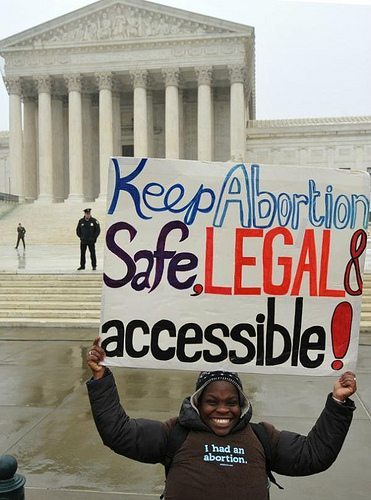Illinois’ Hope Clinic Challenge: Does Abortion Law Exist Under Its Own Kind of Federalism?
A challenge to the Illinois parental involvement statute raises the question of whether state law really can provide stronger support for abortion rights than the federal constitution.

At its most basic level, the decision in Roe v. Wade guaranteed women in every state the right to chose an abortion. Usually the impact of the decision is discussed in the context of expanding rights of women in states that had previously criminalized abortion care. But some states, like Illinois, actually provide greater privacy protections for women than recognized in Roe and later Planned Parenthood v. Casey. So what happens when a legislature passes an abortion restriction that may be in line with federal precedent but conflicts with state constitutional protections? We’re about to find out.
In Illinois, pregnant minors generally enjoy the same rights to consent to medical care as adults do. That means they can make nearly every decision concerning the pregnancy without parental involvement. Pregnant minors can also consent to place their child up for adoption without parental notification, involvement, or consent. In fact, throughout the entire course of her pregnancy, a minor can access and consent to a panoply of care without her parents involvement—unless of course she wants to terminate that pregnancy. Then, and only then, does the state of Illinois require a pregnant minor to notify her parents.
Under the Consent by Minors to Medical Procedures Act, abortion is singled out for parental notification prior to treatment, requiring that “physicians or his or her agent” to give “at least 48 hors actual notice to an adult family member of [a] pregnant minor…of his or her intention to perform the abortion.” Those doctors who fail to abide by the notification provision face professional discipline and civil penalties. The law also contains a judicial bypass provision that requires the minor to appear before a circuit court judge and demonstrate, by a preponderance of the evidence that: (1) she “is sufficiently mature and well enough informed to decide intelligently whether to have an abortion, or (2) that notification under Section 15 of [the] Act would not be in the best interest of the minor.
The law has a long and tortured legal history. Passed in 1995, it has been enjoined for the last seventeen years while challenges to the law’s constitutionality proceed. At one point the case was dismissed on the grounds that federal law holds parental notification statutes do not pose an undue burden on a right to chose abortion. After more appeals the matter is now before the Illinois Supreme Court and should the court side with the challengers, Illinois could become an example of states offering broader protections to abortion rights than at the federal level.
Unlike the mandatory ultrasound and (mis)informed consent bills, the Illinois legislature issued cursory findings of fact to support the need for the bill, simply stating it was necessary because “[t]he medical, emotional, and psychological consequences of abortion are sometimes serious and long-lasting and immature minors often lack the ability to make fully informed choices that consider both the immediate and long range consequence.” That provision stands in stark conflict to the rest of the medical decisions a minor is allowed to make concerning her pregnancy under the law underscoring the political, and not medical, motives behind parental involvement here.
Just as importantly, it conflicts with the consensus of the medical community about the long-term potential harms from abortion and a minor’s ability to make a fully-informed medical decisions and may just give challengers the opening they need to strike the bill altogether. Challengers to the law argue their case was wrongly dismissed before a trial court could hear the medical testimony against parental notification. No evidence was submitted to show the danger and long-term consequences of forced birth. No evidence was submitted on the safety of abortions compared to carrying a pregnancy to term. How can there be a conclusion the law didn’t pose an undue burden under the Illinois Constitution, the challengers assert, if a court has never heard evidence to support or rebut the conclusion the notification requirements pose no undue burden here?
It’s a question that strikes at the heart of the tensions between the federal and state constitutional protections at issue here. Those challenging the constitutionality of the law argue the state’s constitution has additional protections that are not in the federal constitution, including an explicit right to privacy and a statement on gender equality. In response the state argues there is no legal basis for an absolute right to an abortion and that the state’s parental notification statute simply cannot pose an undue burden. Because the law provides for exceptions to the parental notification requirement like judicial bypass, cases of abuse and medical emergencies, there is no undue burden on minors seeking abortions. In essence, the state is relying on federal law to support an abortion restriction that directly conflicts state constitutional law.
It’s a tortured form of federalism and one that reflects the fundamental hypocrisy within the anti-choice legal community. Unlike the United States Constitution, the Illinois Constitution grants an express right of privacy which the Illinois Supreme Court has held embraces as fundamental the right to make independent medical decisions, including the decision to terminate a pregnancy. Now it’s up to the Illinois Supreme Court to decide just how fundamental this right to privacy really is and whether it does reach beyond the limitations set forward in Planned Parenthood v. Casey, or if abortion rights get their own special kind of federalism.
